| Listing 1 - 10 of 17 | << page >> |
Sort by
|
Book
ISBN: 1282451251 9786612451256 0833048635 0833046527 9780833048639 9781282451254 9780833046529 Year: 2009 Publisher: Santa Monica, CA : Rand,
Abstract | Keywords | Export | Availability | Bookmark
 Loading...
Loading...Choose an application
- Reference Manager
- EndNote
- RefWorks (Direct export to RefWorks)
The author combines macroeconomic history with a brief exposition of economic theory that stems from and explains that history and explores how that experience may apply to the future. He examines the Great Depression, World War II and the following prosperous quarter century, the stagflation and recovery of the 1970s and 1980s, the information technology boom that lasted through the 1990s, and the current economic crisis. In most macroeconomic crises, the worst case--depression or inflation--is fairly clear, and modern policymakers have the tools at hand to cope. He warns that the worst case
Economic forecasting. --- Globalization -- Economic aspects. --- International economic relations. --- International economic relations --- Globalization --- Economic forecasting --- Commerce --- International Commerce --- Business & Economics --- Economic aspects --- Economic aspects. --- Economics --- Economic policy, Foreign --- Economic relations, Foreign --- Economics, International --- Foreign economic policy --- Foreign economic relations --- Interdependence of nations --- International economic policy --- International economics --- New international economic order --- Forecasting --- Economic indicators --- Economic policy --- International relations --- Economic sanctions
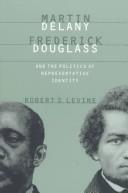
ISBN: 0807862916 0807823236 9780807862919 0807846333 9780807823231 9780807846339 9798890868541 Year: 1997 Publisher: [Place of publication not identified] University of North Carolina Press
Abstract | Keywords | Export | Availability | Bookmark
 Loading...
Loading...Choose an application
- Reference Manager
- EndNote
- RefWorks (Direct export to RefWorks)
The differences between Frederick Douglass and Martin Delany have historically been reduced to a simple binary pronouncement: assimilationist versus separatist. Now Robert S. Levine restores the relationship of these two important nineteenth-century African American writers to its original complexity. He explores their debates over issues like abolitionism, emigration, and nationalism, illuminating each man's influence on the other's political vision. He also examines Delany and Douglass's debates in relation to their own writings and to the work of Harriet Beecher Stowe. Though each saw himself as the single best representative of his race, Douglass has been accorded that role by history--while Delany, according to Levine, has suffered a fate typical of the black separatist: marginalization. In restoring Delany to his place in literary and cultural history, Levine makes possible a fuller understanding of the politics of antebellum African American leadership.
American prose literature --- African Americans in literature --- Politics and literature --- Group identity in literature --- Slavery in literature --- English --- Languages & Literatures --- American Literature --- History and criticism --- History --- Slavery and slaves in literature --- Slaves in literature --- Literature --- Literature and politics --- Afro-Americans in literature --- Negroes in literature --- Political aspects --- American literature --- 19th century --- United States --- Stowe, Harriet Elizabeth Beecher --- Delany, Martin Robison, 1812-1885. Blake --- Politics and government --- Douglass, Frederick --- North Star (Rochester, N.Y.) --- Enslaved persons in literature --- Politics and literature. --- Group identity in literature. --- Slavery in literature.
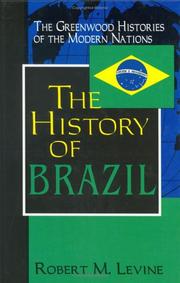
ISBN: 0313303908 031303219X 9780313032196 9780313303906 9798400664502 Year: 1999 Publisher: Westport, Conn. : London : Greenwood Press, Bloomsbury Publishing,
Abstract | Keywords | Export | Availability | Bookmark
 Loading...
Loading...Choose an application
- Reference Manager
- EndNote
- RefWorks (Direct export to RefWorks)
"Relatively bland historical introduction for general readers emphasizes economic development, social inequality, and apparent inability of reforms to address inequality. Begins in 1500, but more than half of volume is devoted to post-1930 Brazil and contemporary issues. Getúlio Vargas is central both as a reformist turning point in politics and as a representative enigma. Useful, but much less piquant and heartfelt than author's Brazilian legacies (item #bi 00006099#)"--Handbook of Latin American Studies, v. 58.
Book
ISBN: 1469605651 0807887889 9780807887882 9781469605654 9780807832264 9780807859032 080783226X 0807859036 9798893132076 Year: 2008 Publisher: Chapel Hill : University of North Carolina Press,
Abstract | Keywords | Export | Availability | Bookmark
 Loading...
Loading...Choose an application
- Reference Manager
- EndNote
- RefWorks (Direct export to RefWorks)
American literary nationalism is traditionally understood as a cohesive literary tradition developed in the newly independent United States that emphasized the unique features of America and consciously differentiated American literature from British literature. Robert S. Levine challenges this assessment by exploring the conflicted, multiracial, and contingent dimensions present in the works of late eighteenth- and nineteenth-century American and African American writers. Conflict and uncertainty, not consensus, Levine argues, helped define American literary nationalism during this period.
Black nationalism in literature.
---
Race relations in literature.
---
Literature and society
---
American literature
---
Nationalism and literature
---
Literature and history
---
National characteristics, American, in literature.
---
Literature
---
Literature and sociology
---
Society and literature
---
Sociology and literature
---
Sociolinguistics
---
English literature
---
Agrarians (Group of writers)
---
Literature and nationalism
---
History and literature
---
History and poetry
---
Poetry and history
---
History
---
History.
---
History and criticism.
---
Social aspects
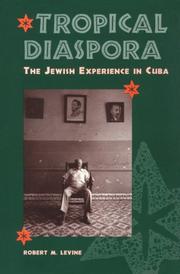
ISBN: 0813021871 9780813021874 081301218X 9780813012186 Year: 1993 Publisher: [Place of publication not identified] University Press of Florida
Abstract | Keywords | Export | Availability | Bookmark
 Loading...
Loading...Choose an application
- Reference Manager
- EndNote
- RefWorks (Direct export to RefWorks)
Jews --- Immigrants --- Latin America --- Regions & Countries - Americas --- History & Archaeology --- Hebrews --- Israelites --- Jewish people --- Jewry --- Judaic people --- Judaists --- Ethnology --- Religious adherents --- Semites --- Judaism --- History --- Cuba --- Ethnic relations. --- Küba --- Guba --- Kkuba --- Republic of Cuba --- República de Cuba --- キューバ --- Kyūba --- Kuuba --- History.
Book
ISBN: 0674915283 0674915267 9780674915268 9780674055810 0674055810 9780674915282 Year: 2016 Publisher: Cambridge, MA : Harvard University Press,
Abstract | Keywords | Export | Availability | Bookmark
 Loading...
Loading...Choose an application
- Reference Manager
- EndNote
- RefWorks (Direct export to RefWorks)
Frederick Douglass’s changeable sense of his own life story is reflected in his many conflicting accounts of events during his journey from slavery to freedom. Robert S. Levine creates a fascinating collage of this elusive subject—revisionist biography at its best, offering new perspectives on Douglass the social reformer, orator, and writer.
African American abolitionists --- Abolitionists --- Slaves --- Antislavery movements --- History --- Douglass, Frederick, --- Bailey, Frederick Augustus Washington, --- Bailey, Freddie, --- Bailey, Fred, --- Baly, Frederick Augustus Washington, --- Enslaved persons
Book
ISBN: 110854701X 1316154939 1108548113 1107095069 1107478006 Year: 2018 Publisher: Cambridge : Cambridge University Press,
Abstract | Keywords | Export | Availability | Bookmark
 Loading...
Loading...Choose an application
- Reference Manager
- EndNote
- RefWorks (Direct export to RefWorks)
Inspired by Toni Morrison's call for an interracial approach to American literature, and by recent efforts to globalize American literary studies, Race, Transnationalism, and Nineteenth-Century American Literary Studies ranges widely in its case-study approach to canonical and non-canonical authors. Leading critic Robert S. Levine considers Cooper, Hawthorne, Stowe, Melville, and other nineteenth-century American writers alongside less well known African American figures such as Nathaniel Paul and Sutton Griggs. He pays close attention to racial representations and ideology in nineteenth-century American writing, while exploring the inevitable tension between the local and the global in this writing. Levine addresses transatlanticism, the Black Atlantic, citizenship, empire, temperance, climate change, black nationalism, book history, temporality, Kantian transnational aesthetics, and a number of other issues. The book also provides a compelling critical frame for understanding developments in American literary studies over the past twenty-five years.
American literature --- Race in literature. --- Transnationalism in literature. --- African Americans in literature. --- Blacks in literature. --- Black nationalism in literature. --- Negroes in literature --- Afro-Americans in literature --- African American authors --- History and criticism. --- Blacks in literature --- Black people in literature.

ISBN: 0521781590 0521786983 110712039X 0511175965 0511066910 0511060602 0511304145 0511509588 1280417978 1139146467 0511069049 9780511509582 9780511066917 9780511175961 9780521781596 9780521786980 9780511069048 9781280417979 9786610417971 6610417970 Year: 2001 Publisher: Cambridge, U.K. ; New York : Cambridge University Press,
Abstract | Keywords | Export | Availability | Bookmark
 Loading...
Loading...Choose an application
- Reference Manager
- EndNote
- RefWorks (Direct export to RefWorks)
Japanese Frames of Mind addresses two main questions in light of a collection of research conducted by both Japanese and American researchers at Harvard University: What challenge does Japanese psychology offer to Western psychology? Will the presumed universals of human nature discovered by Western psychology be reduced to a set of 'local psychology' among many in a world of unpredicted variations? The chapters provide a wealth of new data and perspectives related to aspects of Japanese child development, moral reasoning and narratives, schooling and family socialization, and adolescent experiences. By placing the Japanese evidence within the context of Western psychological theory and research, the book calls for a systematic reexamination of Western psychology as one psychology among many other ethnopsychologies. Written in mostly non-technical language, this book will appeal to developmental and cultural psychologists, anthropologists interested in psychological anthropology, educators, and anyone interested in Japanese and Asian studies.
Psychology --- Ontwikkelingspsychologie --- sociale en morele ontwikkeling. --- J4120 --- J4127 --- Behavioral sciences --- Mental philosophy --- Mind --- Science, Mental --- Human biology --- Philosophy --- Soul --- Mental health --- Japan: Sociology and anthropology -- social psychology and social-cultural phemomena --- Japan: Sociology and anthropology -- social identity and self --- Japan: Sociology and anthropology -- social psychology and social-cultural phenomena --- Health Sciences --- Psychiatry & Psychology
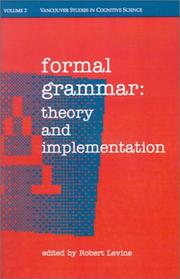
ISBN: 1280526017 0195344928 1429406968 9781429406963 9780195073140 0195073142 9786610526017 661052601X 019507310X 0195073142 9780195073102 019772163X Year: 1992 Publisher: New York : Oxford University Press,
Abstract | Keywords | Export | Availability | Bookmark
 Loading...
Loading...Choose an application
- Reference Manager
- EndNote
- RefWorks (Direct export to RefWorks)
The second volume in the 'Vancouver Studies in Cognitive Science' series, this collection presents recent work in the fields of phonology, morphology, semantics, and neurolinguistics. Its overall theme is the relationship between the contents of grammatical formalisms and their real-time realizations in machine or biological systems. Individual essays address such topics as learnability, implementability, computational issues, parameter setting, and neurolinguistic issues. Contributors include Janet Dean Fodor, Richard T. Oehrle, Bob Carpenter, Edward P. Stabler, Elan Dresher, Arnold Zwicky, Mary-Louis Kean, and Lewis P. Shapiro.
Biolinguistics --- Computational linguistics --- Formalization (Linguistics) --- Grammar, Comparative and general --- Linguistic analysis (Linguistics) --- Linguistics --- Biology --- Grammar --- Philology --- Congresses.
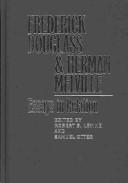
ISBN: 1469606690 9781469606699 9780807831847 0807831840 9780807858721 0807858722 9798890880864 Year: 2012 Publisher: Chapel Hill : The University of North Carolina Press,
Abstract | Keywords | Export | Availability | Bookmark
 Loading...
Loading...Choose an application
- Reference Manager
- EndNote
- RefWorks (Direct export to RefWorks)
Frederick Douglass and Herman Melville: Essays in Relation
African Americans - Intellectual life - 19th century. --- African Americans -- Intellectual life -- 19th century. --- American literature - 19th century - History and criticism. --- American literature -- 19th century -- History and criticism. --- Cultural pluralism in literature. --- Douglass, Frederick - Political and social views. --- Douglass, Frederick, 1818-1895 -- Political and social views. --- Douglass, Frederick. --- Literature and society - History - 19th century. --- Literature and society -- History -- 19th century. --- Melville, Herman - Political and social views. --- Melville, Herman -- Political and social views. --- Melville, Herman, 1819-1891 -- Political and social views. --- Melville, Herman. --- Pluralism (Social sciences) in literature. --- Race relations - History - 19th century. --- Race relations -- History -- 19th century. --- American literature --- Literature and society --- Race relations --- African Americans --- Cultural pluralism in literature --- English --- Languages & Literatures --- American Literature --- Pluralism (Social sciences) in literature --- Integration, Racial --- Race problems --- Race question --- Relations, Race --- Ethnology --- Social problems --- Sociology --- Ethnic relations --- Minorities --- Racism --- Literature --- Literature and sociology --- Society and literature --- Sociology and literature --- Sociolinguistics --- History and criticism --- History --- Intellectual life --- Social aspects --- Douglass, Frederick, --- Melville, Herman, --- Political and social views. --- Melville, Herman --- Melvill, German --- Melville, Hermann --- Meville, Herman --- Melvil, Cherman --- Mai-erh-wei-erh, Ho-erh-man --- Melṿil, Herman --- Tarnmoor, Salvator R. --- מלוויל, הרמן, --- מלויל, הרמן, --- ميلڤيل، هرمن، --- 麥爾維爾, --- Virginian spending July in Vermont, --- Melvill, Herman, --- Bailey, Frederick Augustus Washington, --- Bailey, Freddie, --- Bailey, Fred, --- Baly, Frederick Augustus Washington, --- History and criticism.
| Listing 1 - 10 of 17 | << page >> |
Sort by
|

 Search
Search Feedback
Feedback About UniCat
About UniCat  Help
Help News
News